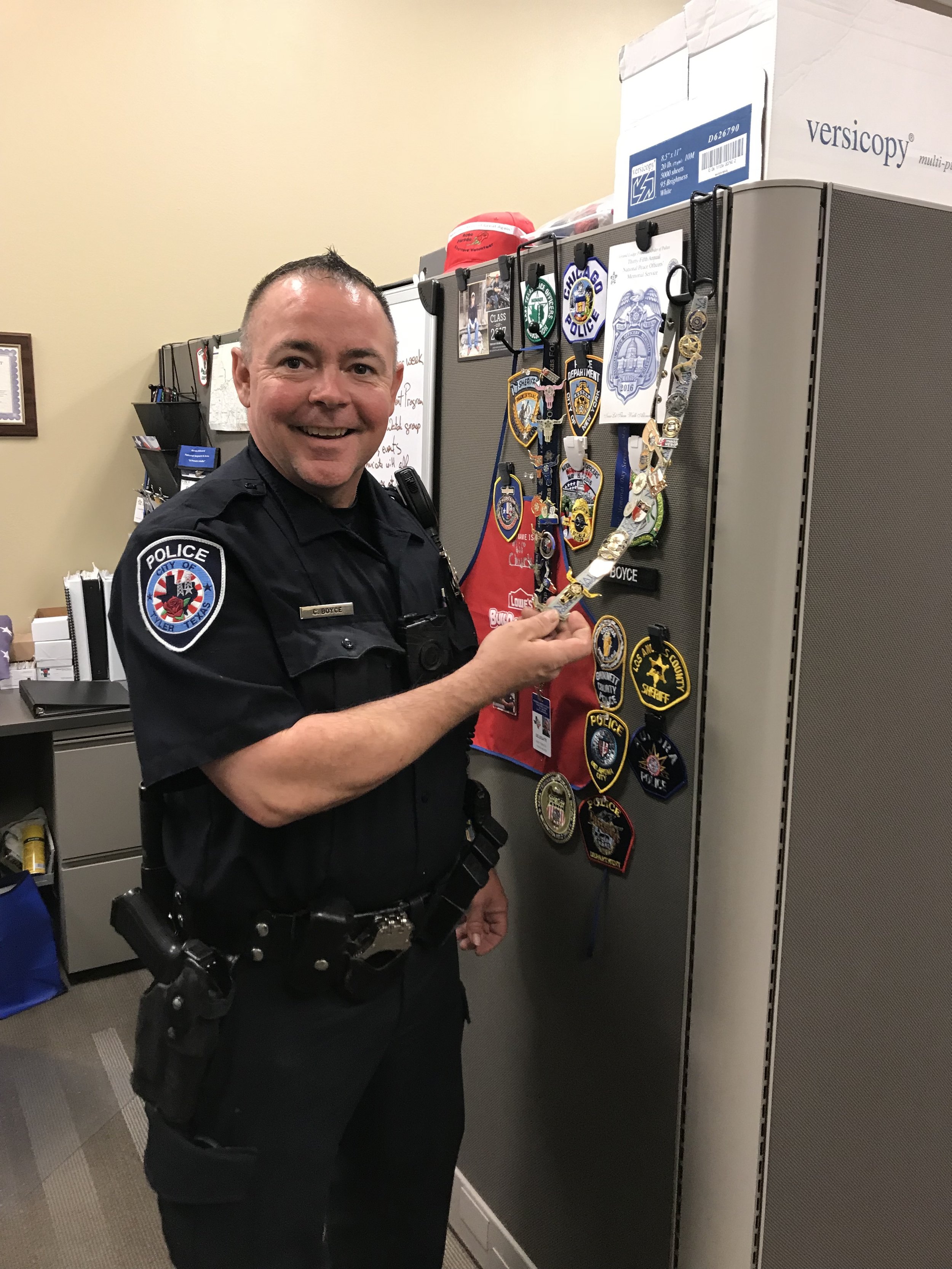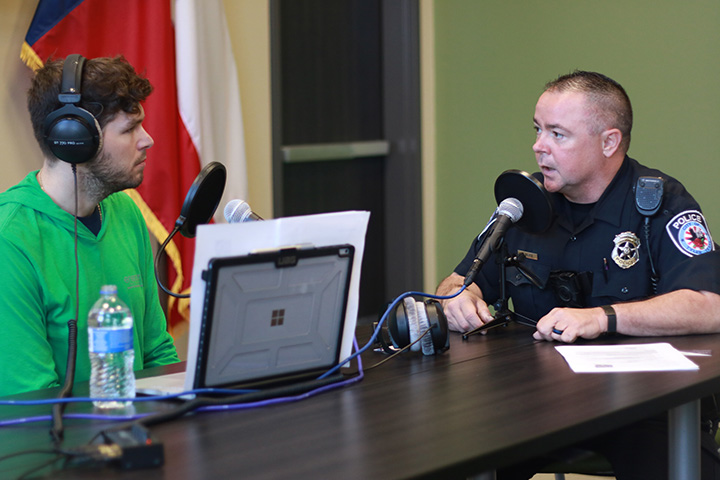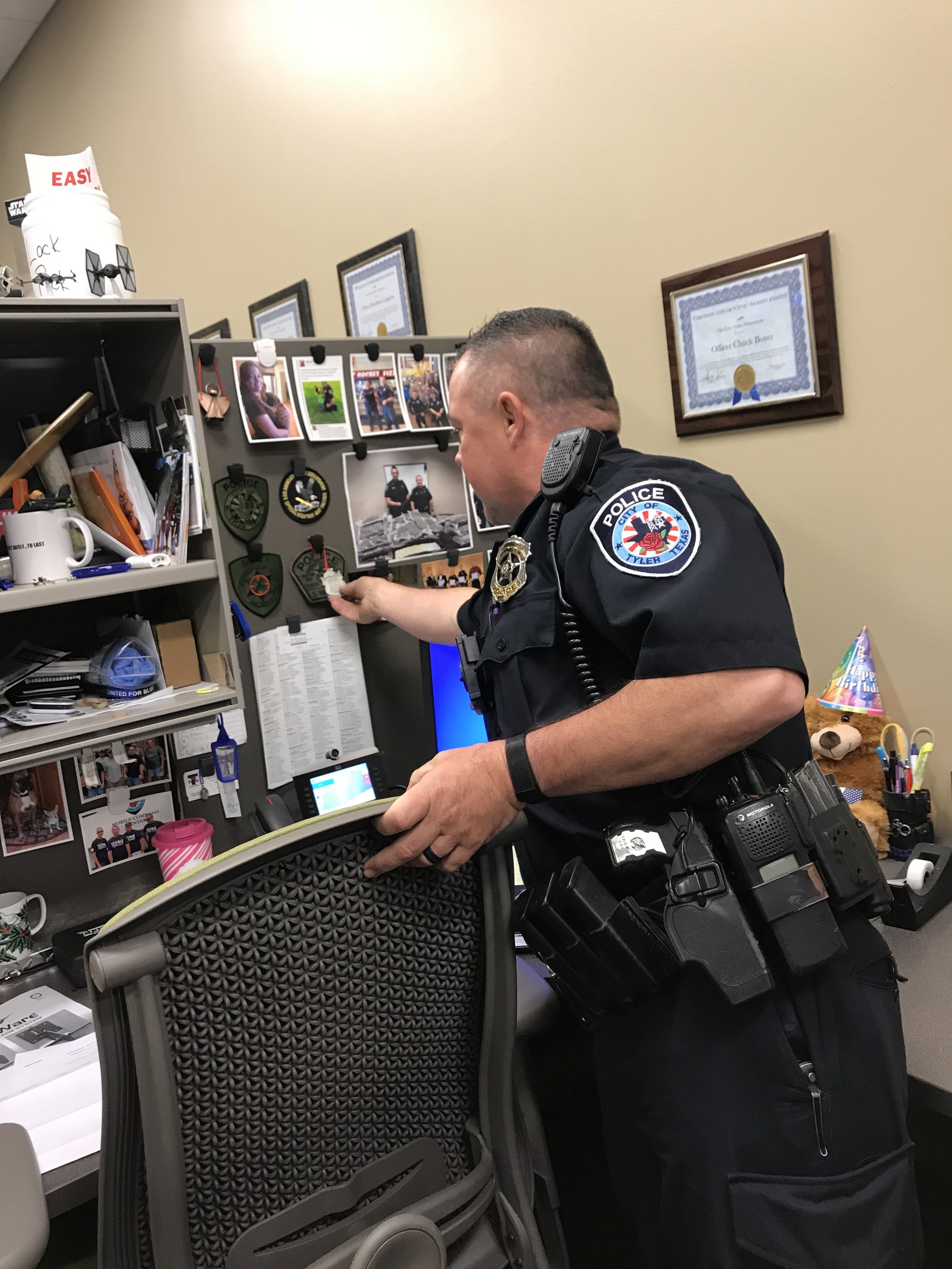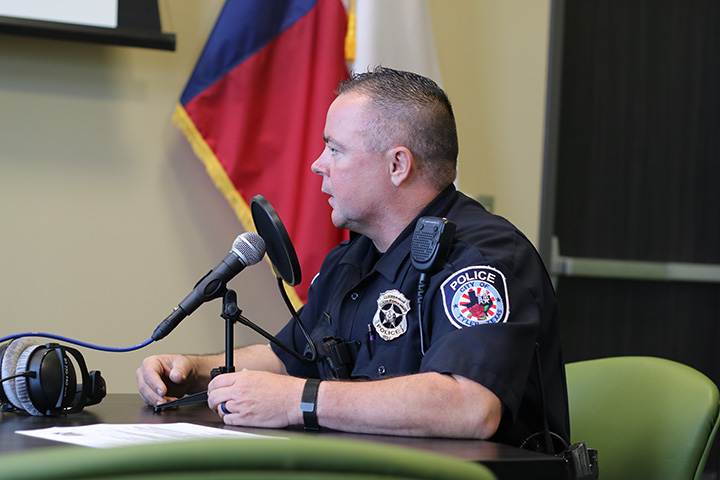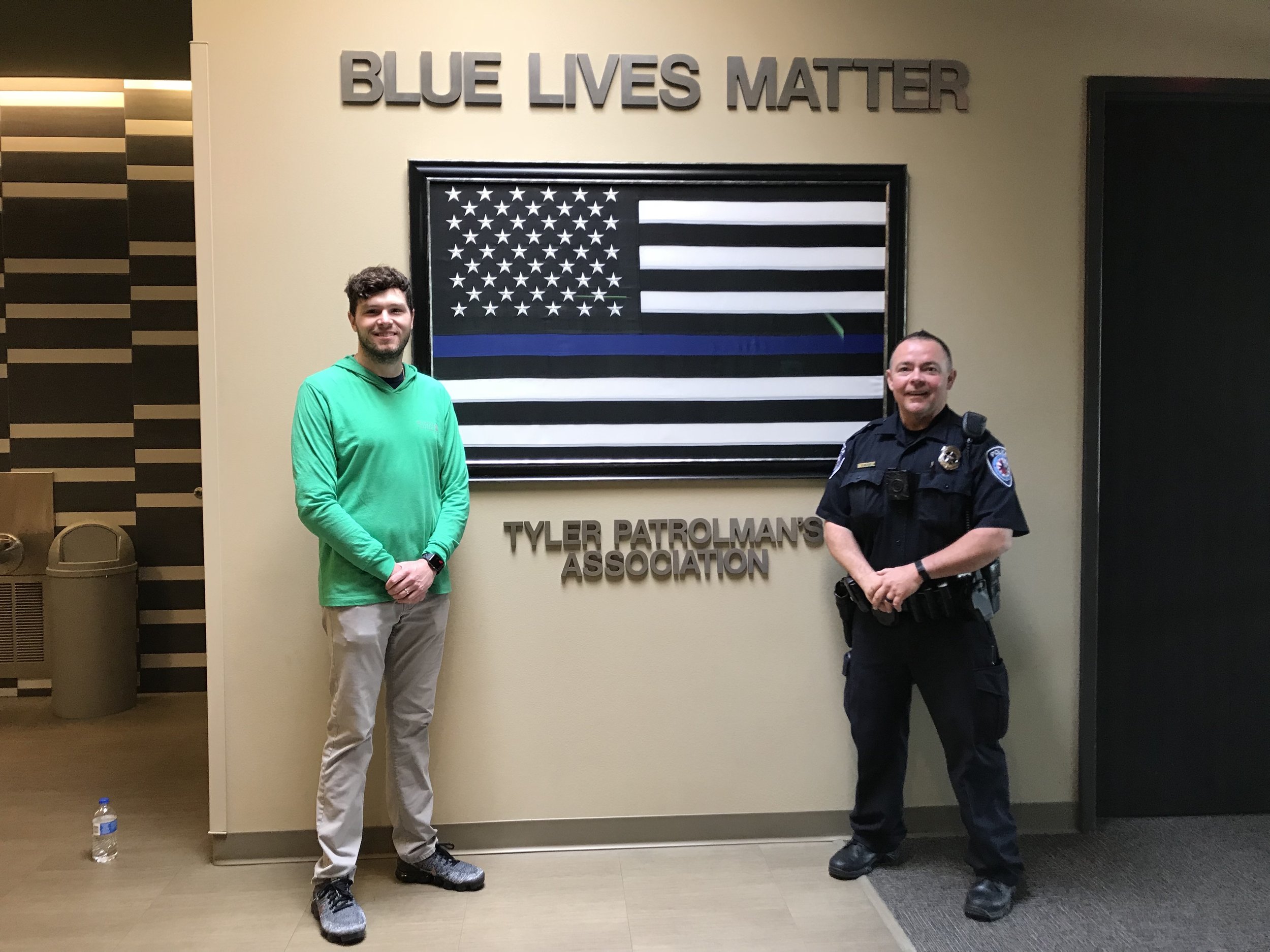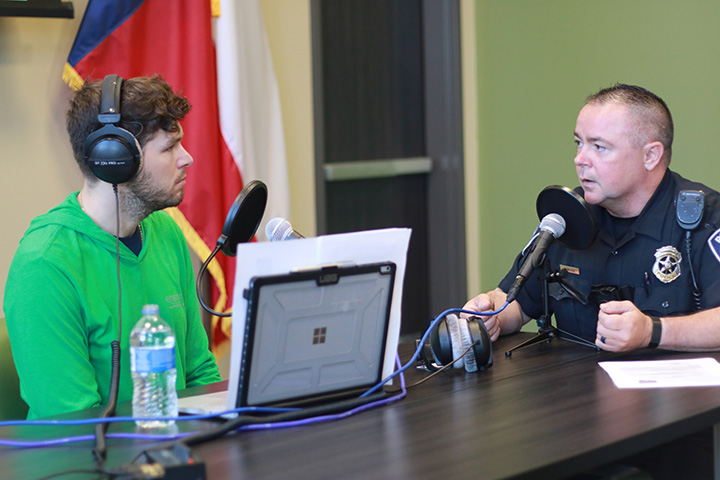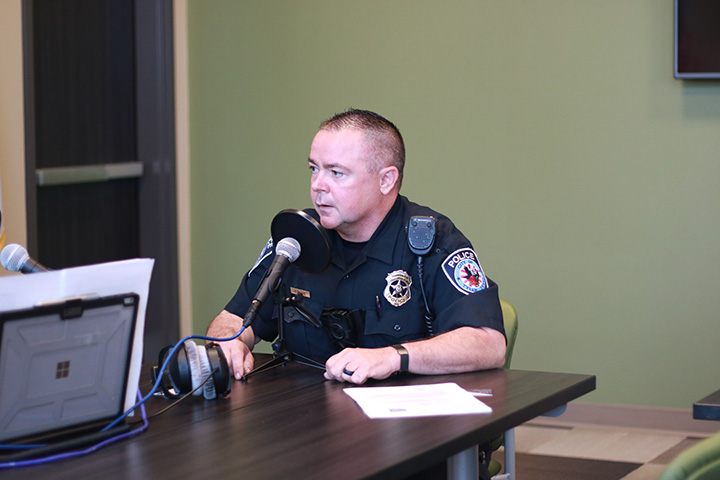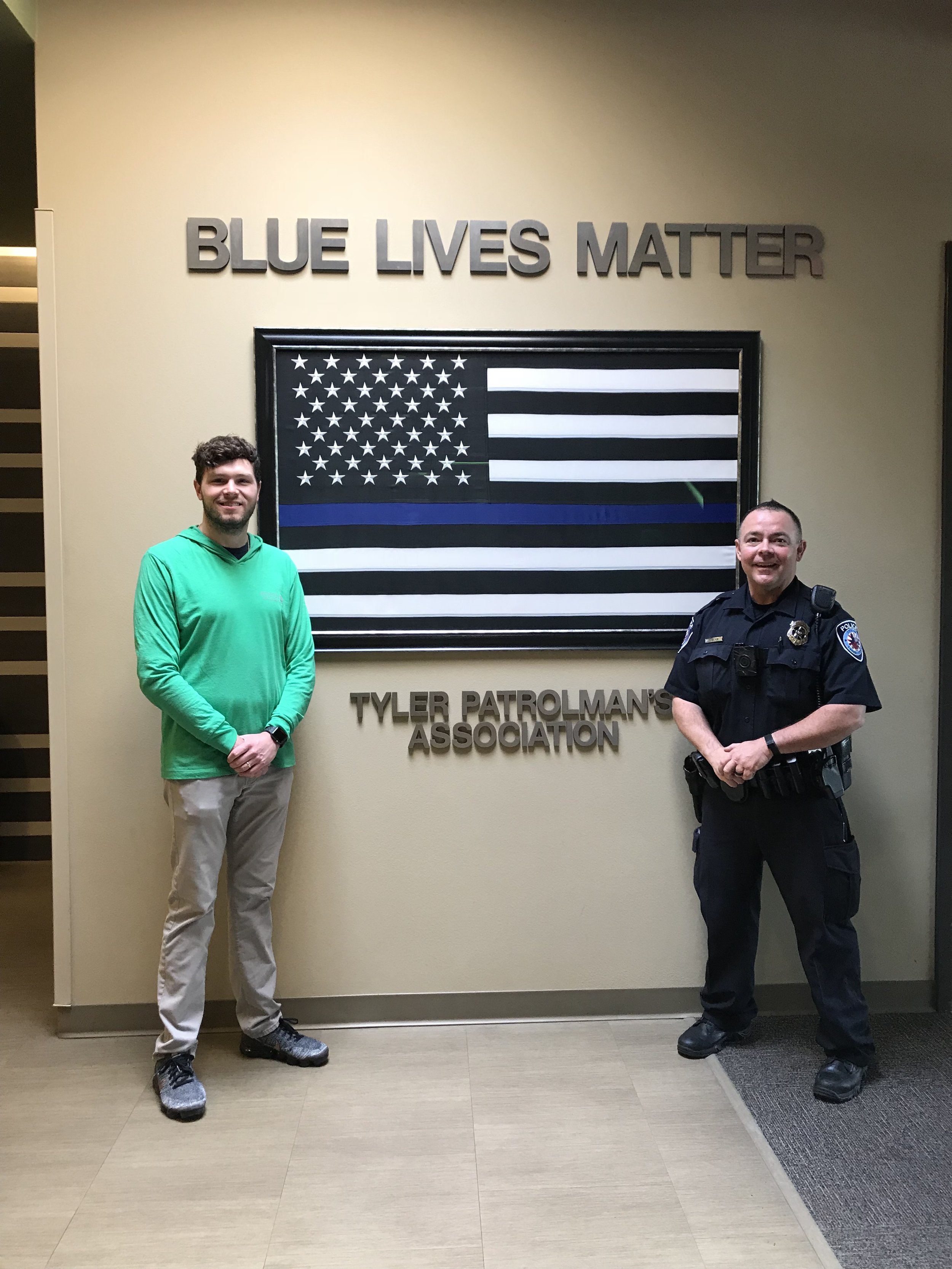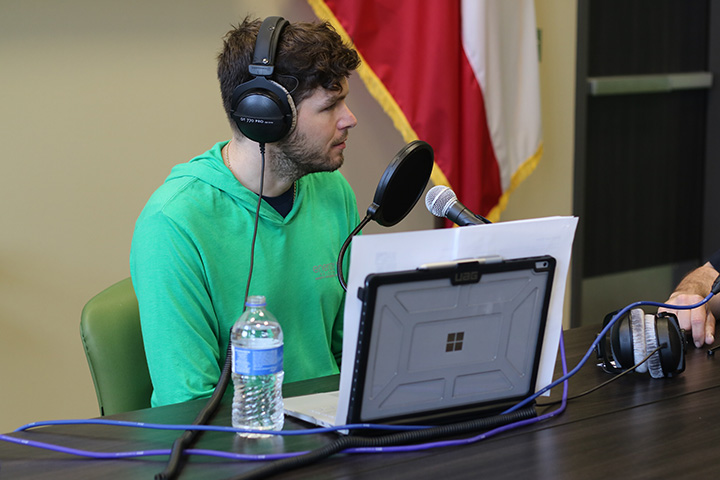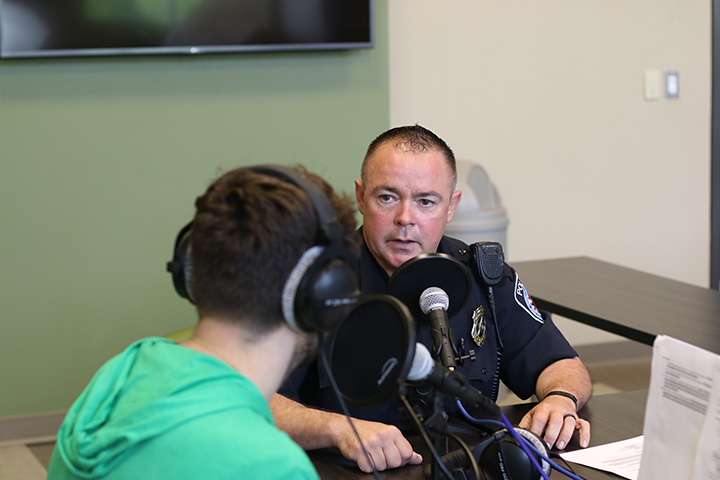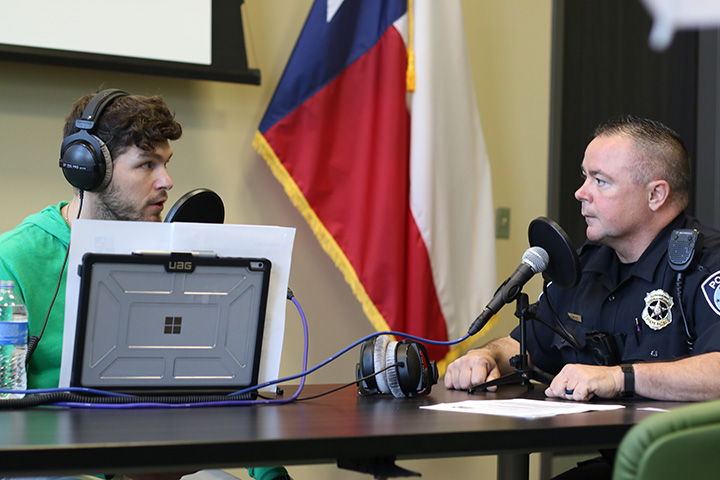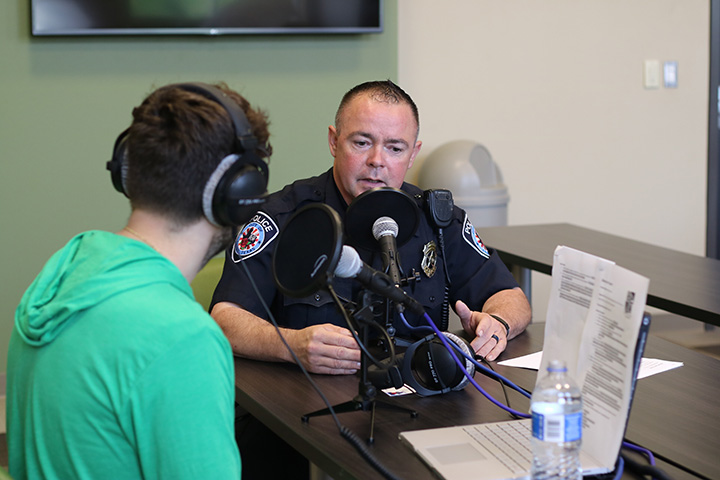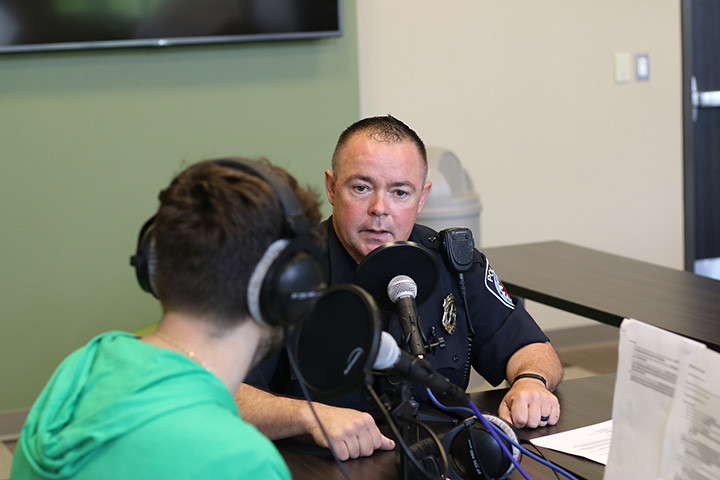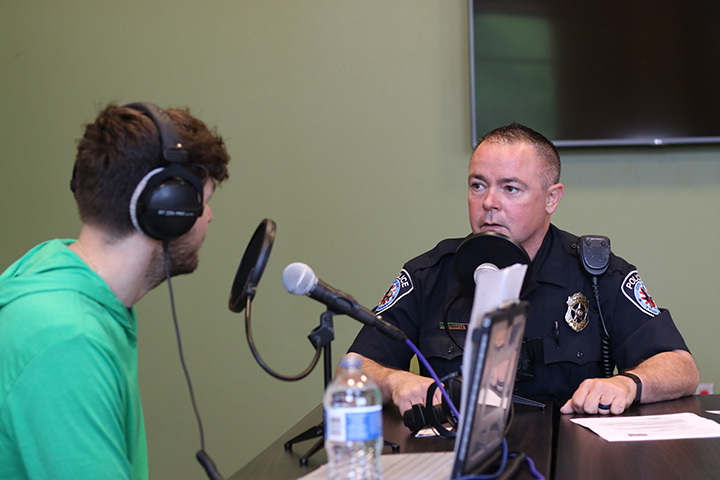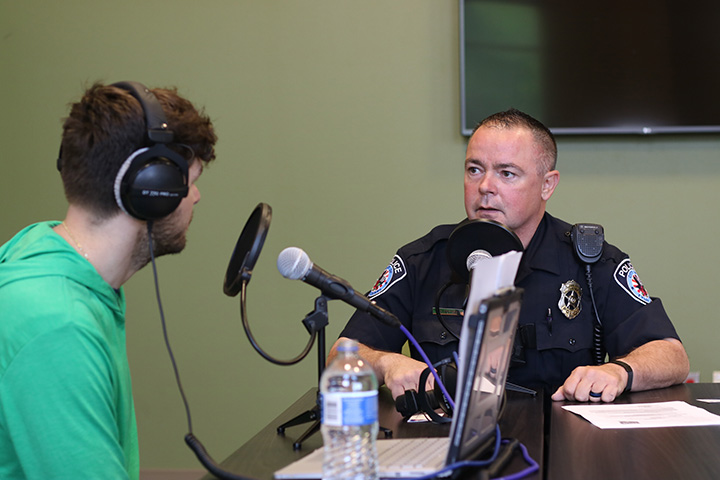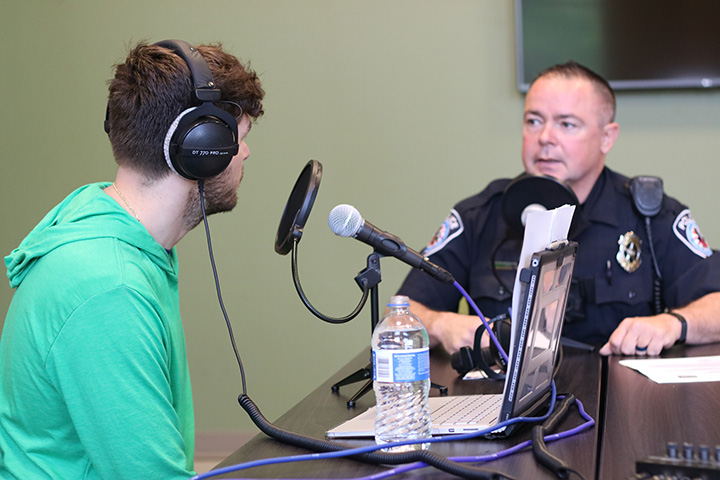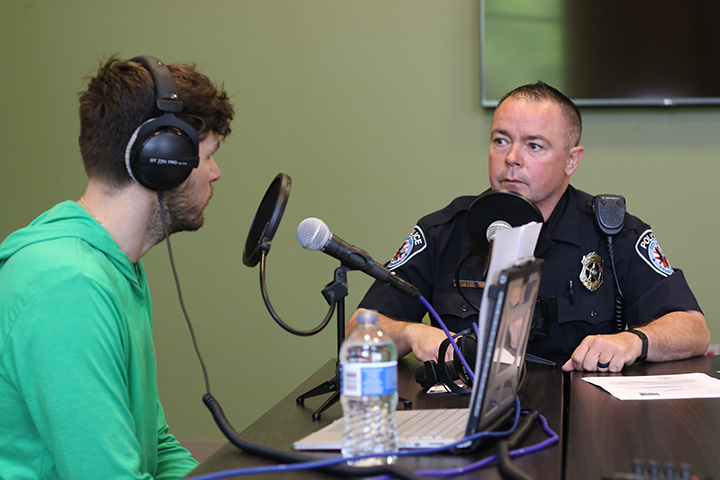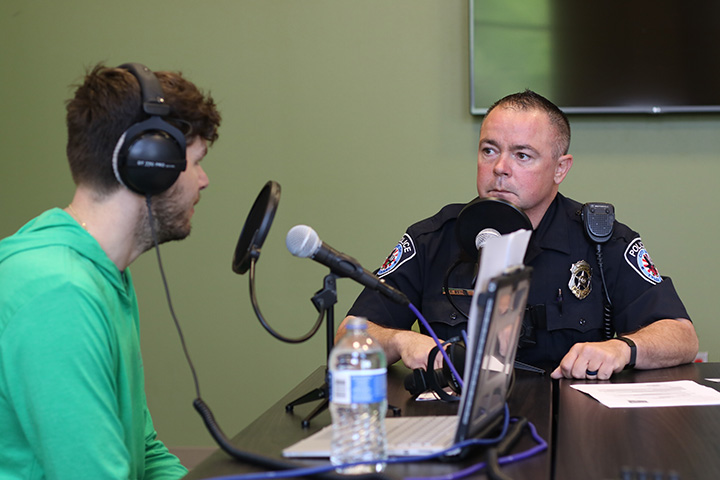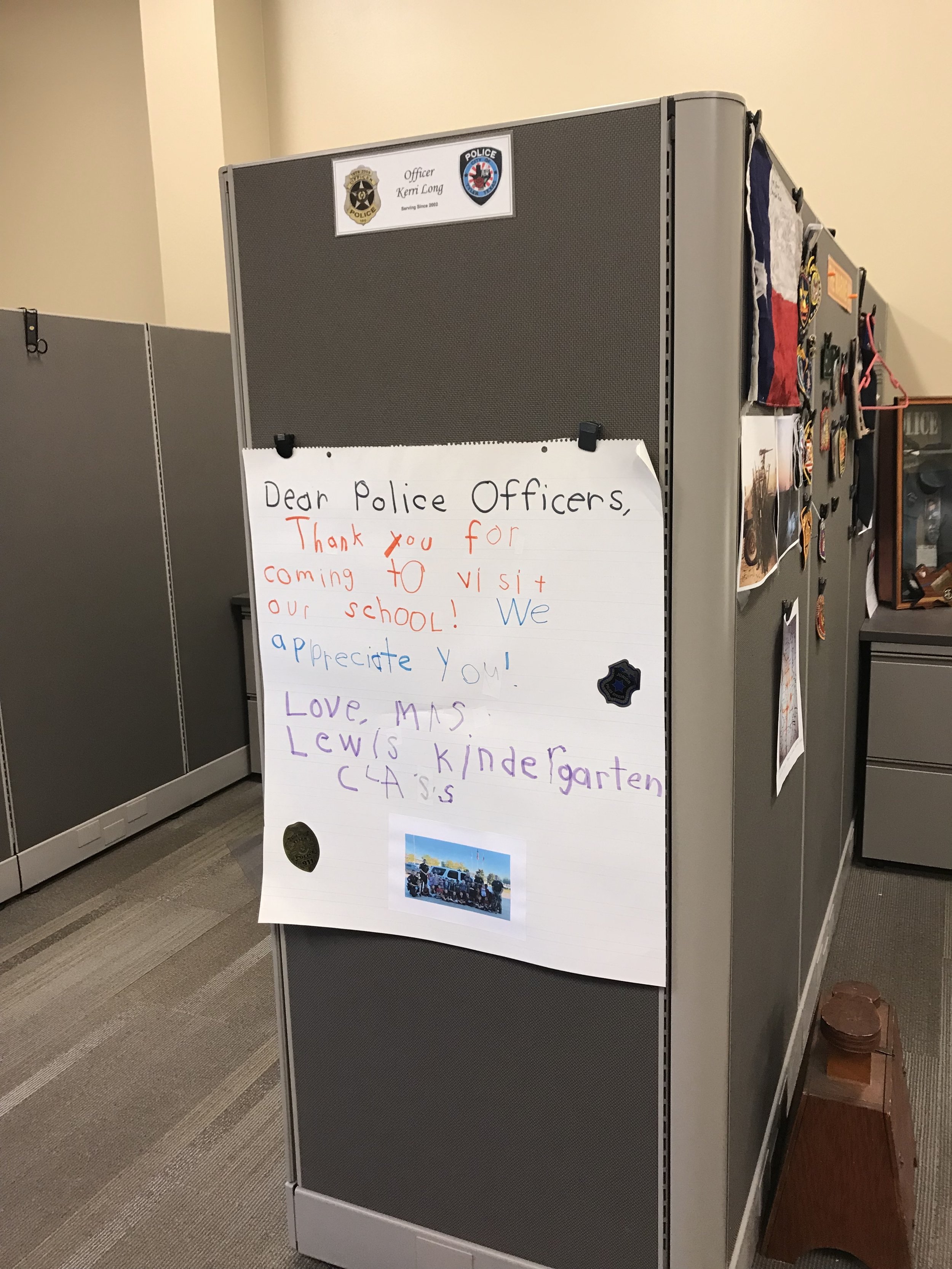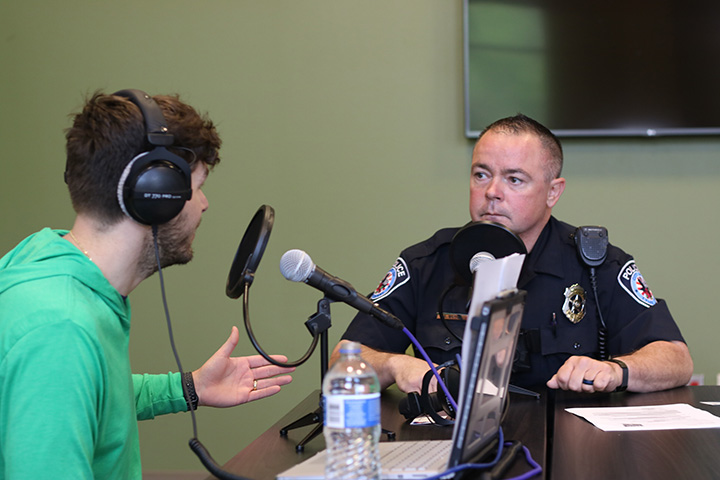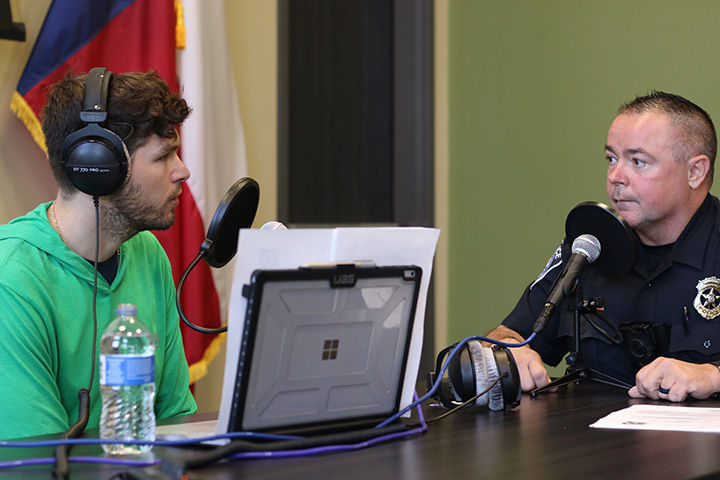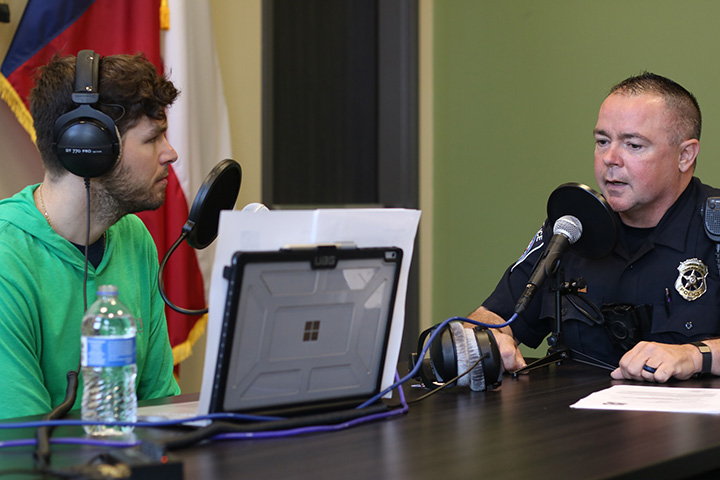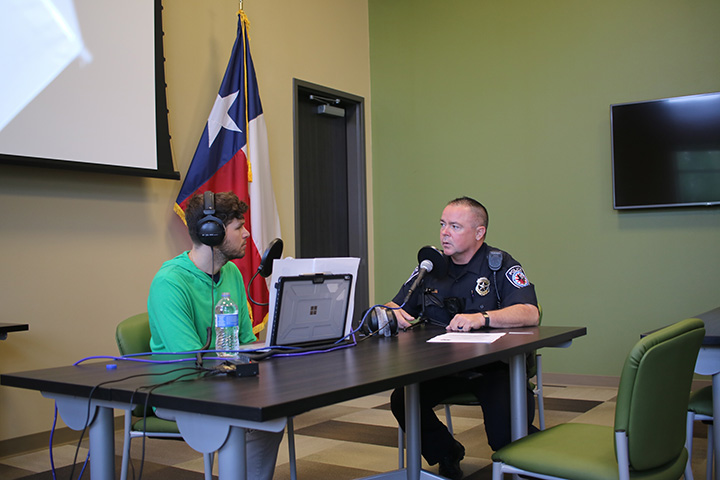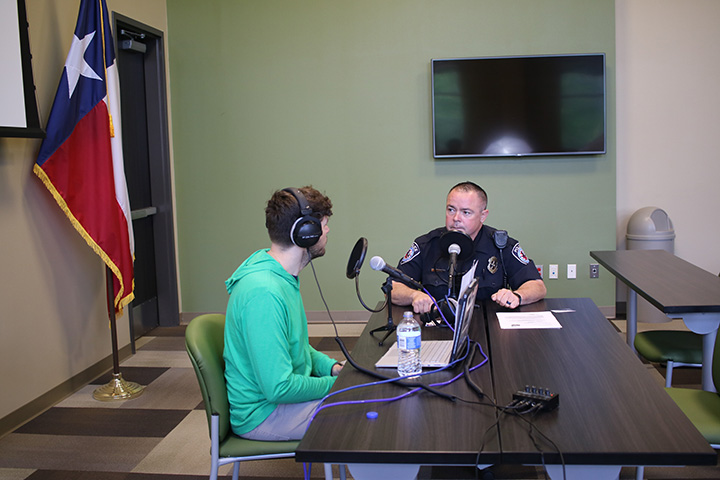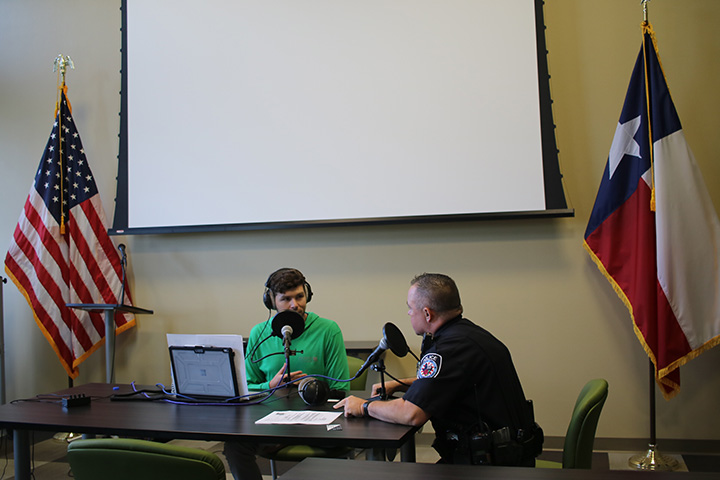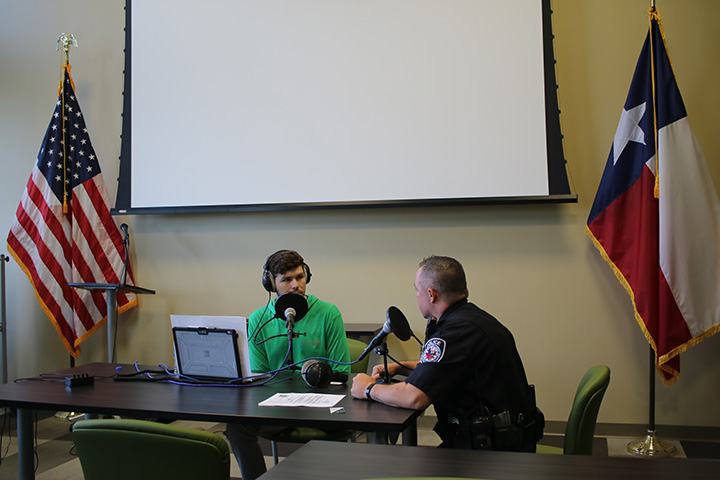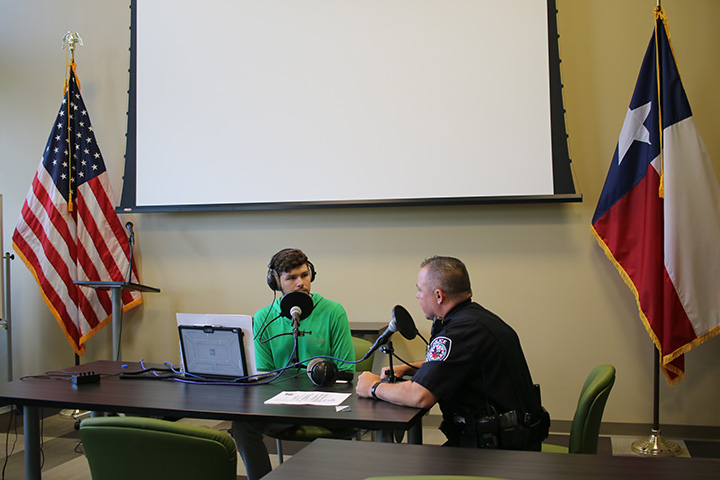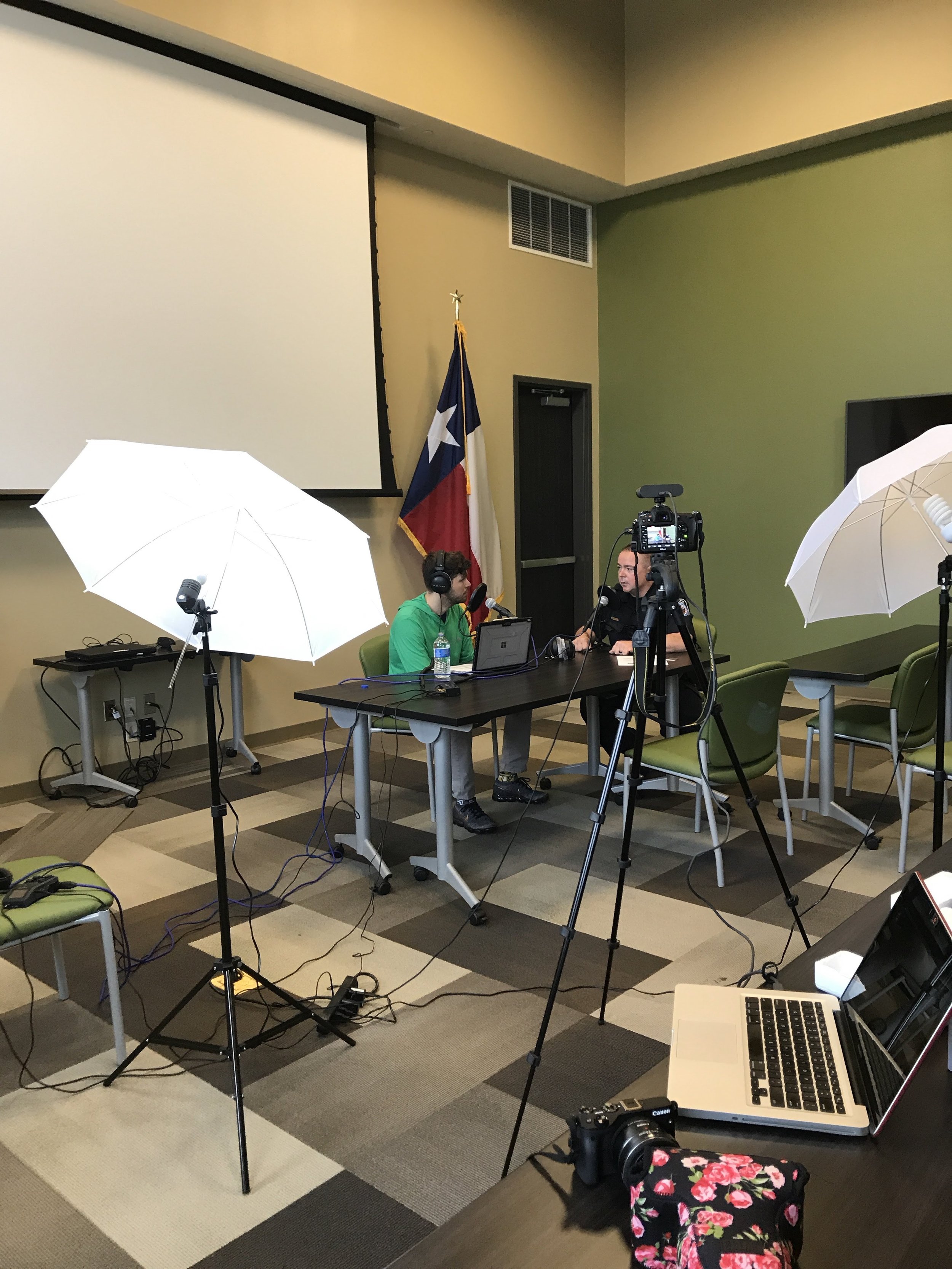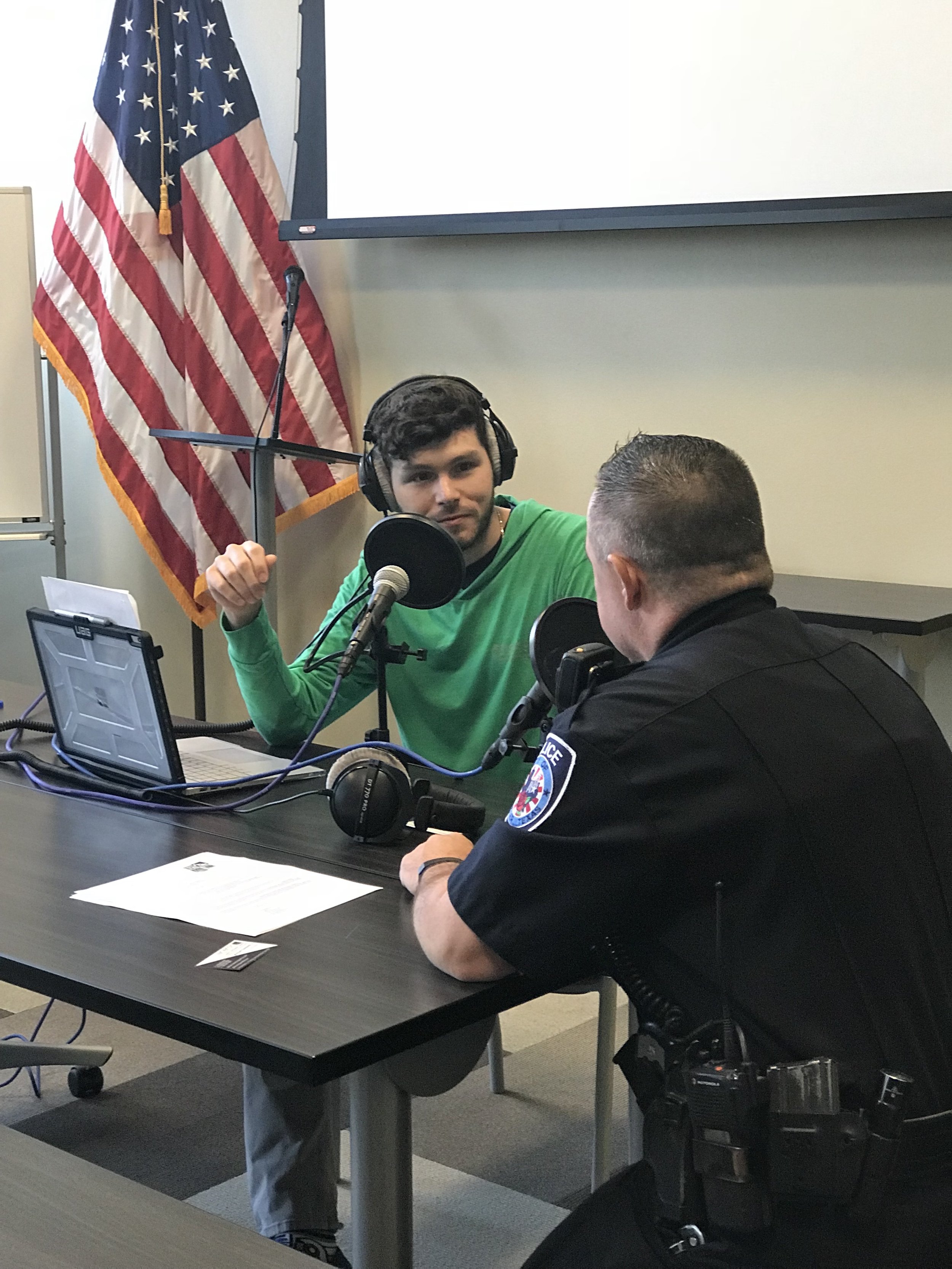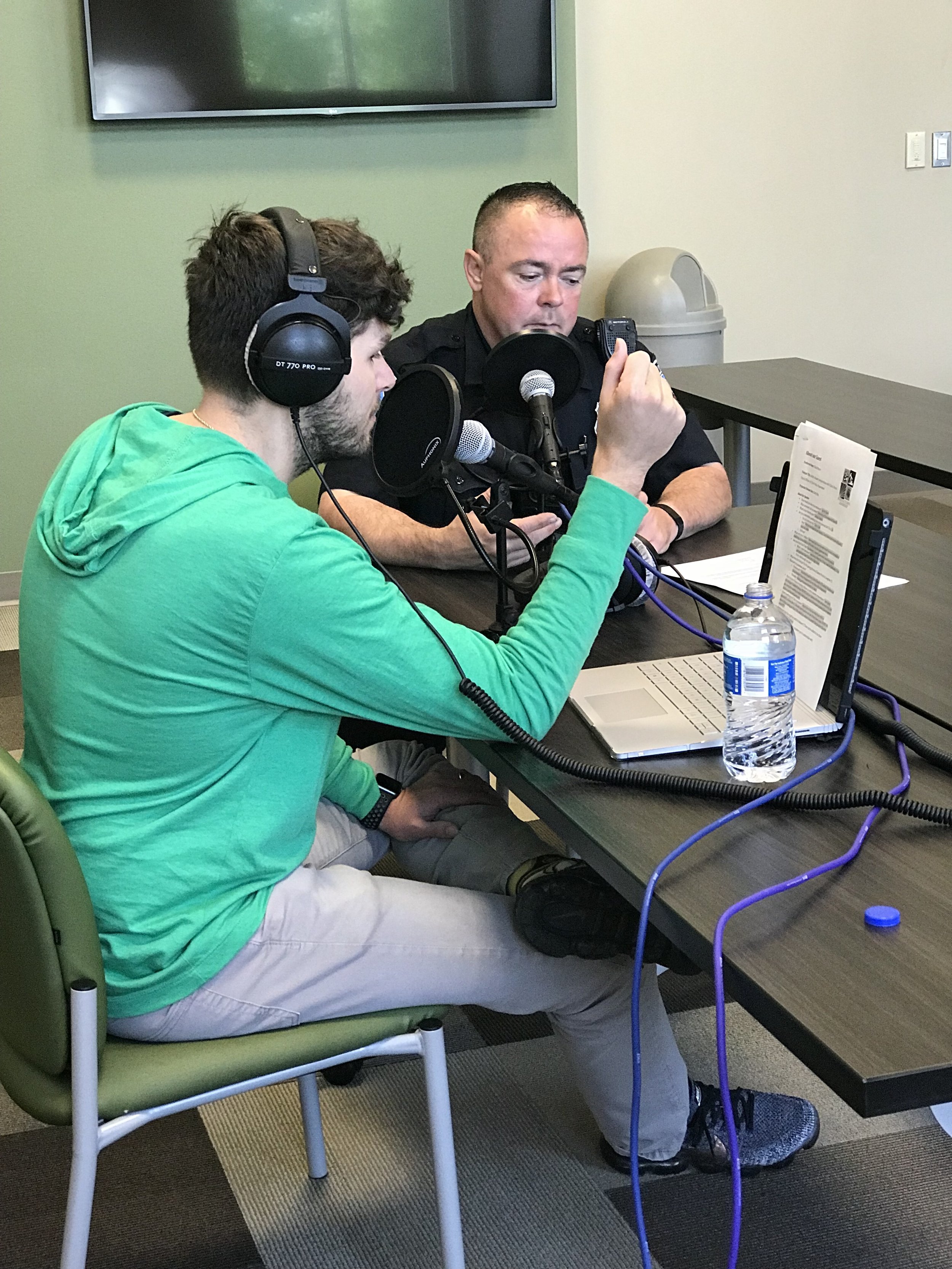Michael and Officer Boyce tackle a tough subject - active shooter preparedness. Officer Boyce holds workshops throughout East Texas teaching civilians how to handle active shooter situations whether they occur in the classroom, place of business or church.
Show Episode Transcript
Manufacturing Leadership
Active Shooter Preparedness with Officer Chuck Boyce
Intro:Welcome to manufacturing leadership, a podcast for young professionals in and out of the oil and gas industry. And now here's your host, Energy WeldFab's Michael Clements.
Michael C.: Hello listeners, welcome to manufacturing leadership an oil and gas podcast, I'm your host Michael Clements and I'm here today with patrol officer of Tyler Police Department Chuck Boyce. How you doing today Chuck?
Chuck Boyce: I'm good, what about yourself?
Michael C.: I'm doing excellent. Very excited to be here, and excited to talk about active shooter preparedness, I think this is an important topic and a hot topic in our society today. So this is very exciting to have someone who's going to be able to share some knowledge with us today on this. So Chuck tell us a little bit about yourself, where'd you grow up?
Chuck Boyce: I grew up over in Union Grove right outside Gladewater Texas, hung out there till I graduated in from Union Grove High School then went on to University of Tennessee at Knoxville where I graduated with my bachelor's degree, and now I'm back here in my hometown area.
Michael C.: All right, well how did you get involved with the Tyler Police Department?
Chuck Boyce: A buddy of mine that works here and I'd went to school with, and when I moved back I simply applied and went through the Academy and got on there.
Michael C.: And you have a passion for something; tell us a little bit about it?
Chuck Boyce: Active shooter preparedness, I took a lot of classes to continue my certification over the years and back in 2014 I went down to San Marcos Texas to take a continuing education class. I thought it was going to be just a class like any other class, you go in there you do your time and then you come back to work. Well I'm about 20 minutes in and I see those kids from columbine needlessly dying, I mean it just blows me away.
So I came back with the passion to talk with anybody and everybody especially our children, to teach them how to survive, you just got to do something. They don't need to go to the old standby tornado position like we all were taught in school when a tornado is there, and that's what they're doing they're freezing, going into tornado position they become easy prey, we've got to talk to our kids.
Michael C.: So it sounds like misinformed and uneducated on this subject is really what you're seeing?
Chuck Boyce: Absolutely, for lack of a better word I think we've got our heads in the sand. I mean we're telling our kids to go back to the room, lock the door, turn out the lights and lay on the floor that does not work for me. At the time I took the class I had a 16 year old, and I come back home I talk with him, my child will not go back to the room, lay on the floor and wait for his turn to die he's going to get out.
Michael C.: Does it increase your chances if you're going to be active when there is an active shooter?
Chuck Boyce: Well if you're not there you can't be killed, so I would think that that would increase your chances are surviving.
Michael C.: Well how did this become a passion for you, you said you watch the video, you saw this you have a son of your own, I guess when did you say I need to be getting out and telling more people about this?
Chuck Boyce: Well I'm a community response officer here at Tyler, so I do have a little bit of a I guess the soapbox to go out and be able to contact folks, churches, businesses, schools and 20 minutes in after seeing that video at Columbine and then I’ve seen grown adults, college students at Virginia Tech doing the same thing.
And don't get me wrong I'm not no bad SWAT dude or anything like that, I'm simple, I don't have a PhD behind my name, I don't have a doctor in front of it, but you can survive you just got to do something and that's what we're trying to teach folks. Is you don't have to be bad to survive, you just got to be committed because helps coming.
We're just seconds if not a minute away, you just got to last long enough for us to get there so you bite, scratch, you kick, you claw I mean you talk trash about them, you do anything you can to belittle them until we get there, because we're coming and we're coming hard.
Michael C.: Yes, it sounds like you just need to disrupt the situation?
Chuck Boyce: Exactly, and we've got a little scenario we'll take one out of a class, and we'll give her a nerf gun or him a nerf gun and we'll say go back into the room and shoot as many people as you can with the nerf gun, and they do, they shoot lots of people. So then we'll grab a second one and we'll go hey I bet you can't beat their count and they're like oh yes I can, so we'll take them out we'll give it in same opportunity, but inside we're giving them nerf balls, little round nerf balls that you can get hit with all day long and it never even hurt you.
So when the second person comes in everybody starts throwing those balls at them, well the person that's shooting cannot really concentrate on who to hit, because they're trying to duck, dodge and dive those nerf balls and not getting it, that they don't hit many people and those nerf balls don't even hurt.
Can you imagine going into a church and everybody's on hymnals at you? They're going to do damage, and we've got some guys out there in church that's got some pretty good arms, 80 mile-an-hour hymnal coming at you it's going to hurt.
Michael C.: So it sounds like just being active, finding something to do besides just lay down?
Chuck Boyce: Exactly, because what you're doing when they come in they're acting, but when you do something back they are no longer in charge they're reacting versus acting.
You disrupt their outer loop which is their thought process observe, orient, decide and act they have to start back over, and so they're trying to absorb what's going on to them so that they can do what they were intending to do.
Michael C.: How often would you say in an active shooter situation the shooter is prepared for disruption?
Chuck Boyce: They're looking for easy prey; they're looking for a high body count in a short amount of time. If they get a high body count they get the media's attention, but if they only get one or two they're never going to get the media's attention.
So they're looking for easy prey, they're not looking for anybody putting up a fight because they're not going to get the exposure or the attention that they really want.
Michael C.: Whenever you're putting on these training classes and doing this with individuals, what is usually the response you get whenever you start telling them this?
Chuck Boyce: They're like wow it's not really that hard or wow I never even thought about that, but we're simplifying survival. Everybody can survive, you just got to do something and don't be easy prey. The biggest thing is we bring it down to their comfort zone, so many people including myself we're so scared of doing the wrong thing.
When I go to a hostile situation I've not been there before, yes I'm scared of making the wrong decisions, well with this there is no wrong decision. You're not going to be judged, you're not going to be critiqued, and you just got to do something. But don't do nothing, because if you do nothing you're easy prey, they get what they came there for, and it defeats everything.
Michael C.: And how likely is it a scenario like this occurring?
Chuck Boyce: Well I'm not an advocate for the lottery, but there's a better chance of you winning the lottery than being in an active shooter. So I don't want you to be all paranoid, I just want you to be aware and the skills that we teach you are not only for an active shooter, but they are for a fire, an earthquake, heaven forbid a tsunami here or any other kind of a traumatic event, a tornado, we just teach you some basic survival skills to do something.
Michael C.: You know here in East Texas this may seem like a silly question, but really what happens if whether you're at a place of business or a school, what if the individuals there have never heard gunshots?
Chuck Boyce: Well they need to act; they do not need to be in denial. Most people have heard gunshots, they know what they are, but they'll go into denial what they want to, their brain is not prepared because they've never thought about it. So what they simply do is they dismiss those gunshots as fireworks, and process it that way.
You need to pre-script, you need to pre plan, and you need to think about what if you always need the what-if scenarios. Don't just assume you're going to come back out the same door that you went in, what if there's a fire at that business, and you're trying to get out the front door and that's where the fire is when there's three perfectly good exits, so you need to think outside the box a little bit.
Michael C.: And this is something, would you encourage every place of business to have a plan of some sort in place?
Chuck Boyce: Even a poor plan is better than no plan.
Michael C.: How often do you find yourself while you're on the job just making plans?
Chuck Boyce: Oh it's constantly, you're in a patrol car, that patrol car is a bullet magnet. Okay, I mean if you think about it how easy it would be to ambush an officer you shoot at the car, so I'm always whether I'm at a red light or I'm at a place of business, I park to where I'm safe then I can see as much as I can. I had a red light I'm prepared to engage or dismount the vehicle, the vehicles is the tool.
Michael C.: Yes. And I like what you said earlier there's no reason to be paranoid, but be prepared, and so by being prepared how often do you find that even in a 2 or 3 hour class, just remembering one thing out of that class could save your life. Do you encourage people to really say hey take this serious, I mean do you find folks not wanting to take it serious?
Chuck Boyce: Oh yes I mean it's only your life, so yes we want you to take it serious. The class is free of charge, me and Officer Luis Aparicio that's my buddy, we typically patrol together, we teach this class together, we went outside of our areas on our own time.
Now however our department is very lenient with us and letting us get this out, but most of all they let us have this great facility to bring as many people in as we can to train them, they've even let us borrow Liberty theater downtown Tyler on two occasions. Our city is a huge supporter of it, so anybody wants to take the class it’s on you, all we need is just three hours of your time, it costs you nothing and you're going to learn a lot.
Michael C.: And it does seem that schools have been a target for active shooters, what can parents does to prepare their kids in the classroom?
Chuck Boyce: Okay, you as parents need to know first of all what's your school's protocol is, and if you don't why don't you? Okay, these are the people that you love the most, okay your children, your grandchildren you need to know. You need to sit down with their teachers; you need to find out if their teacher is a fighter, if their teacher has a plan, okay. I mean if your kids in elementary, kindergarten first second grade obviously their teacher can't get them out, they're going to have to bunker down and they're going to have to fight, and they're going to have to ride the storm out, but does that teacher have a bucket of suckers?
Okay, you need a bucket of suckers for those little kids, because when something traumatic happens there's going to be cheater chatter everywhere. So you give them each a sucker and that just drops the noise level so the shooter is not going to know you're there, you need to be prepared to turn your phones off fibrate, off of the noise I just turn it on just standby but so you can still call 9-1-1.
You need to find out if your child or your grandchild teacher has even acknowledged that this can happen, we as parents we have the PTA, we have other organizations, we have generally we call the shots, we can dictate what the schools, how they need to be prepared and if we're not doing our job it's on us.
Michael C.: How often do you find that the parent doesn't know what the protocol is for their child's school?
Chuck Boyce: All the time.
Michael C.: Yes, and then probably the same way with a place of business, what is our protocol here?
Chuck Boyce: They're opening their eyes a lot more, the businesses ours because it's becoming part of their action plans and it's being mandated, even the daycares are being mandated to take active shooter training, because I've been given certificates out for the daycares because they got to come every year.
Michael C.: So how should company leaders be preparing their employees, their guests, what in their facilities how can they be preparing for an active shooter?
Chuck Boyce: Well first of all they need to be talking and planning, I mean they need to let their folks know let's sit down in a around let's talk it out, it can happen, we know the chances of it happening are slim to none. But then again workplace violence, and with the economy up and down today's shooter could be yesterday's employee, so we need to talk about it.
Michael C.: Yes, sounds like to me that it's just a matter of having the conversation and just having the conversation one time in your facilities could change the outcome.
Chuck Boyce: Absolutely, it's like I taught the class at United Way a bunch of sweet little ladies, and they've prepared something simple as they had wasp spray on all their desk every one of them, several of them have hammers in their desk and in case of an active shooter okay they're all going to I guess lose their cognitive abilities, but they're in voluntary action or their muscle memory is going to be to grab that wasp spray and it goes 20 to 22 feet, it's got a foam so you just follow the pathway and if it gets in their eyes they got to go to the emergency room supposedly.
It doesn't work on everybody's calling my OC spray, some guys you spray and they just keep on coming and you're like it's going to be a bad day, so that's my little disclaimer on the wasp spray, but it does disrupt their thought process. And then you grab the hammer and you bust a window and you get out, that plan cost less than $20 it's a simple plan, wasp spray and a hammer. It'll work in cases of a fire, if the building catches on fire you bust a window out with a hammer and get out, it's a multi-purpose plan.
Michael C.: It sounds so simple whenever you describe it that?
Chuck Boyce: Well you just got a talk, like our classes are totally informal; each class is different because we have different crowds. When somebody's got a question we stop right there, we call timeout we talked about it we go down rabbit trails and I learn from them as they learn from me. Because I get everybody's perspective I can on an incident or situation, and then we'll take that to the next class. And so our class continues to evolve, so I love learning from the people that we get to meet.
Michael C.: How often do you come across places of business that are prepared or have someone there that is prepared in the event of an active shooter?
Chuck Boyce: They're getting more prepared, they're looking at the layouts of their the building, they're preparing the front office door greeter area. Some of them are actually putting walls up, and some of them have got, actually have bullet-resistant glass.
So some of them are having to have key cards and they're buzzing people in, some of them like there's only one or two there they won't let anybody in. So you're starting to see the protocol or you're starting to see the actions go up a little bit, and they're just a little bit more responsible now.
Michael C.: How about in other public places grocery stores, shopping malls those types of places, what can you do in a situation like that?
Chuck Boyce: Well that's a family plan, you as a family need to have a designated meeting place every time you go somewhere. I mean at least talk about it like hey kids if we all get separated or hey family like for a Broadway Square Mall, we're going to meet at Chipotle if you can't meet at Chipotle we'll meet over at McAllister’s, okay.
If something happens at the mall it could be a bomb threat, it could be a fire, it could be whatever some person loses control of a car, drives through and obviously there's going to be chaos. So just to have a simple plan, nothing extravagant.
Michael C.: That's just a matter of taking 15 or 20 seconds whenever you get out of the car with your family.
Chuck Boyce: Exactly 15 or 20 seconds. I mean like today your kids are at school you're at work, your wife's at work what if a tornado come and walked your house up, do you have a designated plan, and you have a designated meeting place.
So I mean if the cell towers are out, you can't call them I mean you need to have just a simple plan, that if we all get separated and the cell towers are down, our house gets wiped out let's meet at the Tyler Police Department on 7-eleven West Ferguson, in the lobby.
Michael C.: With the rise in active shooter situations, have you seen there be a rising interest in people wanting to be prepared?
Chuck Boyce: A lot of people want to be prepared but they do not take the time, and this class is two and a half to three hours and it flies by. Nobody's regretted taking the class, I've had people that actually said they had to leave early and they wound up staying, nobody has left early.
Every time there's a shooting I get a lot of calls about follow-ups, wanted to expedite the class again and then it just slowly falls off again. So I hate to say that it takes another shooting to spike interest, but that's what it typically does.
Michael C.: And it seems as though you're very adamant about encouraging people to be prepared for this, and like you said earlier I mean it is an unlikely scenario. So why do you think we should be so passionate, why are you so passionate about wanting to get that word out?
Chuck Boyce: Because it's not really that hard to survive, I mean especially with our children we have dead children at Columbine because nobody ever took the time to talk with them.
And I don't want any children in my East Texas area not to have the opportunity to get talked to here, we go to churches, we go to businesses, we go to schools anybody that will give us three hours of their time, me and Luis Aparicio will make it happen. You can survive, it's a waste is what it is when we let our children's die needlessly because we never had that talk with them.
Michael C.: Are you seeing I guess a change in the planning and things that, I guess like you said earlier at businesses you're seeing a change, you're seeing people already coming in a little bit more prepared than maybe they were.
Do you think this is going to be a consistent trend over the next few years, this is going to be kind of become like a fire drill or a tornado drill; do you think this will eventually be in our schools and in our workplaces?
Chuck Boyce: It's got to be, I mean we've got to get our heads out of the sand and it's got to be. I mean because of our fire plan, I mean how many school fires do we have each year, I mean how many people are killed with fires at a school each year, this is because we planned for it, we made adjustments. Same with active shooters we can get it down, and we can get it way down.
Michael C.: This is probably something leaders should really take responsibility for, if you're a leader in an organization and you haven't taken the time to take a look at this, would you say that burden is on a leader in an organization?
Chuck Boyce: Absolutely, I mean these children are your responsibility, their well-being. It's not about the bottom dollar, it's not about the line item objects, it's about those children that are in your school and you care about them. If you truly are in awe of that position you have got to take care of those children, why would you subject them to anything less.
Michael C.: And I would say an action item after this show for our listeners would be to for one if you have children talk to your school, talk to your their teachers, make sure they're prepared and if they're not, what do you suggest they do?
Chuck Boyce: The ball is in our playing field, we are in charge. Okay, you as a parents you're going to have to get with other parents and you're going to have to demand that your children are safe, why would you subject them to that okay I mean these are your children do you love your children more than anything, so why would you allow your children to not be safe.
Michael C.: And there's a lot of theories out there on ways to reduce active shooter situations and things, but at the end of the day there are always going to be evil in the world, you'll never be able to remove that from the world.
So I think that it's very important to find out what is the school doing and also what is my place of business doing, is there a plan where I work and if you're listening and you don't have a plan where you work I would suggest ask your manager, ask your boss, hey what do we do and if they kind of look at you like I don't know, well then would you suggest getting a group of people together and maybe trying to come up with a plan?
Chuck Boyce: Oh absolutely, it can be formal or informal. Simply putting up a sign no guns allowed at this place of business, I'm not a big fan of that. If we outlaw guns why don't we outlaw drugs, that don’t mean that there are no more drugs? Just simply putting up a signs lets the bad guy know that you're all unarmed, okay you're fish in a barrel.
I mean how many active shootings have you seen in a gun show, lots of bad guns there. But an active shooters not going to go somewhere where they're going to get defeated.
Michael C.: Are there are there statistics out there showing that if you have guns in a place there is a reduction in the possibility of an active shooter?
Chuck Boyce: Oh I'm sure those statistics are out there, I do not have them but if you're a bad guy and you had a choice to go into a place where people are armed, or people are unarmed which one would you go to kill people? That's pretty simple in my mind. You have fish in a barrel, and then you have the fish that are armed.
Michael C.: Well do you think with the active shooters and everything, is there anything else that we should be prepared for. I mean are there other ways that I guess violence can occur on a mass scale in a facility?
Chuck Boyce: Oh it can, I mean just a situational awareness, whether you're at the gas pumps and you see somebody smoking, you realize we're all going to blow up. So you either tell him to put that cigarette out or you get out of there, you can fill up at the next gas station. Situational awareness will help you a lot, just knowing where you put yourself just pick your places and think about it before hand.
Michael C.: Well and what advice do you have for our listeners as far as preparing just themselves in solo situations?
Chuck Boyce: Be committed to surviving, I kind of like me, I plan on going home tonight. If a bad situation happens there's not going to be a happy ending, it's not going to be a good thing but I'm committed to muscling through and making it home at the end of the day.
I might need a little bit of therapy, there are some really good therapists out there, I'm going to have to get one but I'm going to make it. You got to be committed, no matter what happens today I'm going to make it.
Michael C.: So what can we learn from past experiences and past active shooter situations?
Chuck Boyce: You can look at them, don't dwell on them, you got to enjoy life, don't get engulfed and paranoid and all that, just be prepared, be committed. Carry your pocket knife, know how to open it with one hand, if you want to be a license to carry a weapon get your permit, know how to shoot your weapon. Think about what if, know your capabilities can I hit something that 20 yards, can I hit something at 50 yards know your qualifications.
Michael C.: One thing I particularly liked was the wall spray?
Chuck Boyce: It's neat, it's simple it's for the older folks like I said shoots 20 to 22 feet, it's kind of foam so you follow the pathway and then it disrupts their thought process. There's a good chance that they're going to have to go to the emergency room if it gets in their eyes, but a truly committed shooter or a truly committed individual is going to muscle through it, but it's going to slow them down, it's going to disrupt their thought process.
It's like us as officers when we spray somebody with pepper spray we all get sprayed, but we have been sprayed numerous times and we know how to muscle through it, so we continue doing our job wrestling the bad guy, putting the cuffs on and then getting him in the car after that we search him. But we're still pepper-sprayed, it's just we know how to fight through it.
Michael C.: Are other law enforcement agencies in other cities doing what you all are here in Tyler?
Chuck Boyce: I'm not sure about any other departments, I got a buddy down in Palestine, I think its lieutenant Gavin Green he teaches this class. I have a buddy over in Longview officer James Bray he teaches it, several others throughout the state, we're all alert trained so we do everything we can. We also have a fireman captain Jeff Hudgins here in town that's our reserve deputy sheriff for Van Zandt and he teaches over in Van Zandt County.
Michael C.: Okay, I would think that this would be a really, I think it's wonderful what yourself and the Tyler Police Department is doing, just making people more aware of this occurrence and how to survive like you said it's just your life. So do you think that's going to be something that also law enforcement agencies are going to start getting the word more out?
Chuck Boyce: I hope so, as a community response officer I think this is part of our community response duties. I'm a firm believer in an ounce of prevention is worth a pound of cure, okay so if we train our folks now we'll need a whole lot less body bags in the future.
Michael C.: Chuck that's pretty powerful, and coming into this show and thinking about the topic that we were going to be discussing today I was thinking this is a touchy subject, but like you said it's what we got to talk about and one we got to be prepared for. Moving forward, where do you see this going, is the danger going to be reduced anytime soon?
Chuck Boyce: I mean life is dangerous, I mean driving down the road is dangerous, you got an oncoming car going at 60 miles an hour two feet away from you head on head, I mean life is dangerous. So you just prepare yourself, and that's all you can do.
Michael C.: I think that's the common theme here, is just be prepared whether it's constantly training or just knowing hey, I've at least sit through an hour.
Chuck Boyce: The biggest thing is just realize it can happen, so what are you going to do if it does happen. So have a roughed-in plan, just plan on be moving, don't freeze, freeze is not a good answer.
Michael C.: Freeze is not a good answer. Some of the stories that we were talking about before we started the podcast, you'd brought up situations where someone maybe just laid there or didn't do anything, in the event you freeze up, how do you get through that?
Chuck Boyce: Okay, as your heart rate goes up when something crazy or traumatic happens you lose abilities, your cognitive processing goes, you get tunnel vision, you have auditory exclusion, there's a point that you actually bleed less, you're stronger and faster and then you go all the way up to the point where you use the bathroom on yourself you lose bowel and bladder control, but you're still alive you got to put yourself back in the game, okay.
So one of the easiest things to do is a combat breath or a battle breath, what you do is simply breathe in through your nose for a three to four count, hold for one to two count, exhale through your mouth, okay. A repetition of twenty can lower your heart rate 30 beats per minute, when you lower your heart rate you're regaining abilities, okay. Also communicate with the ones around me okay, like my buddy Louis we'll be en-route to a call and we're both everybody gets scared, but what we do is we communicate with each other, hey is your radio on channel one, hey is your mic own, hey is your camera on, your body cam, make sure.
We'll go through a little checklist and that comes us down, sometimes when a traumatic event happens you've always got those couple people that stay a little calmer than others, a simple touch on the shoulder in a direction will get them back in the game. Like if I simply touch you on the right shoulder and say hey I need you to lock that door, okay and then I go grab somebody else, hey I need you to call 911 tell them what's going on. Hey, I'm the third person I need you to go find another way out of this room, something a little bit of direction they're so worried about not meeting my request that they kind of forget about what's going on.
Also fear it's an emotion, you can convert fear into another emotion, and okay everybody gets scared. But let's imagine a mom and a child welcome to a park, okay the mom and the baby they've run across a suspicious dog, they're both scared. But what happens if that dog attacks that child, mama with no regard for her own personal safety goes into mama bear mode, all that fear goes to anger and rage to take that dog out.
They come into your place of worship, they come into your business I mean that's your family, they're not blood family but they're your family because you spend a lot of time with them. You have to convert all that fear into anger and rage, and you got to do something. So there's ways around to convert that freeze option, and you just got to start thinking about it now.
Michael C.: Let's say in thinking about it as far as our leaders go in those situations, how often is the group looking towards the leader or the manager or the teacher? I'm sitting here thinking like if you're a manager of five or six people and you're in an office together, are people going to start looking to you saying hey, what do we do in this situation?
Chuck Boyce: Most likely, obviously with a classroom.
Michael C.: I know you didn't sign up for it, but hey when you're in a managerial position someone's looking up to you, it just comes to mind I think that's the person they're going to look at.
Chuck Boyce: Oh yes, you're first on the firing line unless somebody steps up like we got a lot of veterans out there, and a lot of times they'll step up. But like in a classroom all the children are looking to the teacher for an answer, that's why we've got to get in here on these teacher workdays and train our teachers.
If you're in an office position and you're the manager yes they're looking towards you, so you need to think about it, you need to know who your guys are because there's a really good chance you do have a veteran in there, and that veteran will typically step up probably just involuntarily because it's just what he's done in the past and he's been in a situation like this before, so he knows what to do and there's a really good chance he could step up and take charge.
Michael C.: I think very important for a manager probably to know this.
Chuck Boyce: Oh by all means.
Michael C.: I could really see that being that's the person hey, and like I said if there's a veteran that's the person I'm going to follow.
Chuck Boyce: Absolutely.
Michael C.: And I know if I'm in that situation or if there was someone who was a past police officer or someone that was in law enforcement. Do you see that companies are wanting to train more individuals, and not just the whole company but specific people in how to handle these situations?
Chuck Boyce: Yes, I mean you have a security guys, security teams, churches have security teams, lots of places of business have security teams now. So yes they are stepping up and trying to prepare for stuff like that.
Michael C.: I hope that's something that if your organization hasn't done that that you're looking to doing that. I know in our place of business we do have a plan, our safety man has put together a plan and we've walked through that. And that's something like you said you don't really expect something to happen, and as you're looking at it you got some people just kind of yes, but at the end of the day it's survival and maybe just a few minutes here of conversation could save your life, even listening to this podcast could completely change your outlook on what you may do in an active shooter situation.
And that was kind of the hope today is that our listeners would be able to learn something from this, I know I've learned something, I mean in our first five minutes of talking, me being here I felt like I knew more about what to do in an active shooter situation than I previously knew and the things you were telling me were just so simple.
Chuck Boyce: It is, they are simple. You can YouTube videos, you can go on the internet, and there are a couple videos and a lot of Intel at www.avoiddenydefend.org that's produced by ALERRT.org no it stands for advanced law enforcement Rapid Response training.
But go to that website www.avoiddenydefend.org and watch those videos, one of them is made by Walmart and ALERRT together, and there's another one that's made by the LA County Sheriff's Department and they're awesome. All you got is 15 minutes to prepare, take that 15 minutes to watch one of those videos, I think one of them nine and a half minutes and the other ones 11 and a half, so eye opening videos.
Michael C.: And for HR managers, this is even something you could be putting into your pre-employment onboarding procedures, if your company's trained and say you did your training at February, if someone started March I think it's important they have to know coming in that this business does have a plan. Do you have any suggestions for how companies can do that a lot of times?
Chuck Boyce: A lot of time their risk management in general is dictating that they do it, I'm coming across a lot of businesses they know and they're looking for a training and we'll go do it because their risk made them and I'm like that's my buddy right there, that's cool that they're dictating that they have to do this training. It's just like a lot of our daycares right now; they're being mandated to have a certificate. So what we done is in order to get a certificate you got to attend one of our classes, and we'll get you a certificate and it's free of charge, doesn't cost you anything but your time.
Michael C.: I got to commend you all and everybody that is being active in this. I keep hearing the word free, I keep hearing the word prepare, and that sounds like that's all you want to do just prepare people how to save their own life in those situations, and it's commendable what you all are doing and I'm excited to be able to learn what I have today, I hope our listeners have been able to learn something. You have any I guess final takes for us?
Chuck Boyce: Just be safe out there, enjoy life and do not hesitate at all to get a hold of me, I'm on Facebook under Chuck Boyce, I've got an email CBOyce@TylerTexas.com I'm on Twitter, Instagram LinkedIn. You got a question, it may take me a day or two or three to get back with you and if I don't get back with you in a timely manner, send it again because I either forgot it or I did not get it, I don't avoid anybody so I will answer your question.
Michael C.: Man Chuck that's awesome and I want to really thank you for doing what you're doing in our community, and I hope that there's other law enforcement agencies and people that will follow suit and take the responsibility that you have, its people like you that are going to make a difference in our communities and it's going to be individuals like you that also we're going to make a difference next time there is an active shooter.
Chuck Boyce: I hope so, I mean I hopefully it never happens, but just having everybody prepared I'm content with that.
Michael C.: Well Chuck I appreciate your time today, and thank you for allowing us and hosting us here at the Tyler Police Office here, it's been a good time this is really a neat facility.
Chuck Boyce: Oh it's awesome, it's like Hollywood Police Department, and it’s a great facility.
Michael C.: Well I'm just glad I got to come in here voluntarily.
Chuck Boyce: Oh yes, you're not out yet.
Michael C.: Chuck thank you for your time today, and if you have any questions Chuck mentioned his email at Seaboys@TylerTexas.com, also he's on Facebook at Chuck Boyce and Twitter @ChuckBoyce113. If you have any questions reach out to him as he said, he'd love to answer those and if you have any questions for us on the show or topics you'd like to hear more about when it comes to being prepared, send us an email at Podcast EnergyWeldFab.com you can also find us on Facebook, Instagram and LinkedIn and Twitter @EnergyWeldFab.
So thank you for listening today, this has been a wonderful show. Chuck thank you again and look forward to bringing our listeners a great material in the future and Chuck if you have any new developments or if you have any new things get in touch with us, we'd love to have another show with you.
Chuck Boyce: Awesome thank you all,
Michael C.: All right, thank you.

